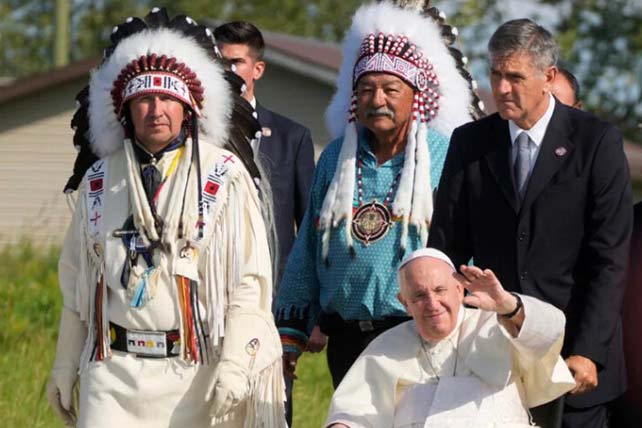VATICAN CITY (AP) — The Vatican on Thursday (March 30) responded to Indigenous demands and formally repudiated the “Doctrine of Discovery,” the theories backed by 15th-century “papal bulls” that legitimized the colonial-era seizure of Native lands and form the basis of some property laws today.
A Vatican statement said the papal bulls, or decrees, “did not adequately reflect the equal dignity and rights of Indigenous peoples” and have never been considered expressions of the Catholic faith.
The statement, from the Vatican’s development and education offices, marked a historic recognition of the Vatican’s own complicity in colonial-era abuses committed by European powers and was issued as history’s first Latin American pontiff, who has made remarkable apologies to Native peoples, was hospitalized with a respiratory infection.
RELATED: Reckoning With Their History, Lutherans Issue Declaration To Indigenous Peoples
Indigenous leaders welcomed the statement, even though it continued to take some distance from acknowledging actual Vatican culpability. The statement said the papal documents had been “manipulated” for political purposes by colonial powers “to justify immoral acts against Indigenous peoples that were carried out, at times, without opposition from ecclesial authorities.”
It said it was right to “recognize these errors,” acknowledge the terrible effects of colonial-era assimilation policies on Indigenous peoples and ask for their forgiveness.
The statement was a response to decades of Indigenous demands for the Vatican to formally rescind the papal bulls that provided the Portuguese and Spanish kingdoms the religious backing to expand their territories in Africa and the Americas for the sake of spreading Christianity.
Those decrees underpin the “Doctrine of Discovery,” a legal concept coined in a 1823 U.S. Supreme Court decision that has come to be understood as meaning that ownership and sovereignty over land passed to Europeans because they “discovered” it.
It was cited as recently as a 2005 Supreme Court decision involving the Oneida Indian Nation written by the late Justice Ruth Bader Ginsburg.
During Pope Francis’ 2022 visit to Canada, where he apologized to Indigenous peoples for the residential school system that forcibly removed Native children from their homes, he was met with demands for a formal repudiation of the papal bulls.
Two Indigenous women unfurled a banner at the altar of the National Shrine of Sainte-Anne-de-Beaupré on July 29 that read: “Rescind the Doctrine” in bright red and black letters. The protesters were escorted away and the Mass proceeded without incident, though the women later marched the banner out of the basilica and draped it on the railing.
RELATED: Vatican Says They’re Gifts; Indigenous Groups Want Them Back
In the statement, the Vatican said: “In no uncertain terms, the church’s magisterium upholds the respect due to every human being. The Catholic Church therefore repudiates those concepts that fail to recognize the inherent human rights of Indigenous peoples, including what has become known as the legal and political ‘doctrine of discovery.’”
Phil Fontaine, a former national chief of the Assembly of First Nations in Canada who was part of delegation that met with Francis at the Vatican before the trip and then accompanied him throughout, said the statement was “wonderful,” resolved an outstanding issue and now puts the matter to civil authorities to revise property laws that cite the doctrine.
“The Holy Father promised that upon his return to Rome they would begin work on a statement which was designed to allay the fears and concerns of many survivors and others concerned about the relationship between their Catholic Church and our people, and he did as he said he would do,” Fontaine told The Associated Press.

